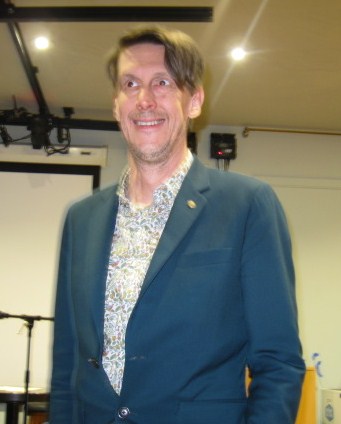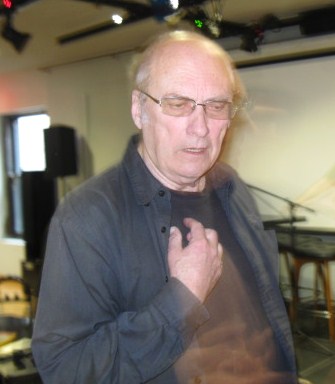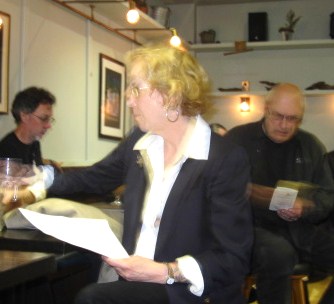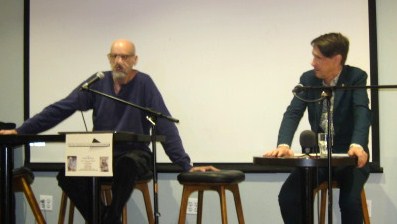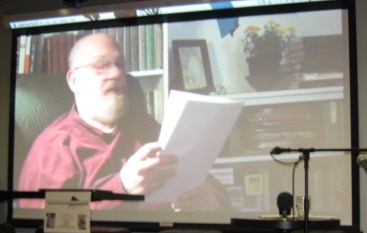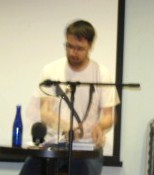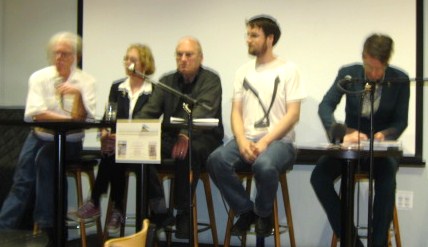(1) A HEART, HAS CHAMBERS. [Item by Olav Rokne.] In their latest edition, WIRED magazine profiles Becky Chambers and talks about both the philosophical underpinning of her writing, and the context in which she’s publishing. The article may be too much of a hagiography for some, but it does provide some insights into what makes her work appealing. “Is Becky Chambers the Ultimate Hope for Science Fiction?”
In a world numbed by cynicisms and divisions, Chambers’ stories are intended to repair—to warm up our insides and restore feeling. So you might say that Chambers is, herself, the tea of our times, a soothing soothsayer whose well-meaning characters act out a fragrant, curative optimism.
(2) THAT’S SHAT. In “William Shatner Reviews Impressions of WIlliam Shatner” on YouTube, Shat reviews impressions of him for Vanity Fair, including a teenager, Jim Carrey, and Bill Nye before he became The Science Guy.
(3) LATINX. Horror Writers Association Blog kicks off its “Latinx Horror” theme in an “Interview with E. Reyes”.
How do you feel the Latinx community has been represented thus far in the genre and what hopes do you have for representation in the genre going forward?
I feel like the Latinx community has finally knocked down that door and we are now being seen. I see more Latinx voices in horror emerging and I will be right there with them.
Who are some of our favorite Latinx characters in horror?
I need to expand more on my Latinx horror reading and viewing, but I’ll say that Robert Rodriguez directed one of my favorite horror movies ever: From Dusk Till Dawn (1996), and it has very awesome Latinx characters in it.
(4) RETURNING TO A FAVORITE. At The Endless Bookshelf, Henry Wessells rereads “Little, Big by John Crowley”.
John Crowley’s Little, Big is a book which I have read more times than I can count. It is also in that rare category of books which I give away (sometimes even the copy in my hand). Readers of the Endless Bookshelf will have seen allusions to my readings over the years (Appraisal at Edgewood, the summer of 2007, or Chapter XIV in A Conversation larger than the Universe or “Strange Enough to Be Remembered Forever”). Everything which Hazlitt enumerates applies to re-readings of Little, Big. This year, when I picked up the novel, I paid attention to recurrences of words and parallels. I don’t say repetitions or doublings because the words often function — that is to say, carry meaning — in a new way when they return to the surface later in the book….
(5) JEOPARDY! Variety says that with Mike Richards out, the Jeopardy! hosting gig will be divided between Mayim Bialik and Ken Jennings.
…Bialik will take over hosting duties for the first couple weeks, starting Sept. 20 and running through Nov. 5. She and Jennings will then trade off as their schedules allow. The two of them will tape enough episodes to get “Jeopardy!” through the end of the year….
(6) QED. James Davis Nicoll’s latest Tor.com hors d’ouerve is “I Sing the Body Electric: 5 SF Works About Sex and Technology”.
Unsurprisingly for a species that once dispatched to the stars at great expense a nude selfie with directions to its home, addressed “To Whom It May Concern”, a large fraction of humans (although not all) has an intense, abiding interest in sex. Consequently, any technology that can assist in the quest for or enhancement of sex enjoys a tremendous advantage over technologies lacking such applications.…
Five books later, Nicoll points out –
(It may seem like there’s a pattern here and there is. Anyone who wants to deny conscious partners autonomy provides a demonstration of why autonomy is needed.)
(7) CLASSIC FRANK HERBERT INTERVIEW. [Item by Soon Lee.] I know all the current interest is in the Denis Villeneuve version of Dune, but as I was noodling around, I stumbled across this 1969 Frank Herbert interview where he talks to Willis E. McNelly about the origins of Dune. Interviewer Willis E. McNelly later wrote the Dune Encyclopedia. It’s a whopping 80 minutes long but fascinating for anyone who is a fan as it is a wide-ranging conversation exploring ecology, sustainability, religion, politics and powers among others. I haven’t finished listening to me but Beverly Herbert also appears in the recording.
(8) BAD LUCK AND TROUBLE, TWO OF MY BEST FRIENDS. Joe Lansdale talks about his Hap and Leonard series and pays tribute to Michael K. Williams who played Leonard Pine in the television adaptation of the series. A new collection of Hap and Leonard stories is coming from Tachyon in 2022. “Joe R. Lansdale Remembers The Genesis of Hap and Leonard and Pays Tribute to Michael K. Williams” at CrimeReads.
… My subconscious may have created them, but I felt as if Hap and Leonard were friends of mine. I was more like Hap than Leonard, but my inner voice, Leonard, was willing to contest my common viewpoints, and from time to time, teach me something.
When I first wrote about Hap and Leonard, black and white friends existed in fiction and film, but their friendship, I truly believe, was unique for the times. The racism Leonard met head on was real. Folks I knew said, oh, it’s not like that anymore.
That wasn’t what I was seeing….
(9) MEDIA BIRTHDAY.
- 1963 – Fifty eight years ago this evening on ABC, The Outer Limits series premiered. Created and executive produced by Leslie Stevens, who had done nothing of a genre nature before, and directed by far too many to note here. Two episodes, “Demon with a Glass Hand” and “Soldier”, were written by Harlan Ellison, Clifford Simak wrote “The Duplicate Man” episode, and David Duncan penned “The Human Factor”. Eando Binder gets credit for the “I, Robot” episode. Though The Outer Limits achieved cult status it was not long lived, lasting but two seasons and forty-nine episodes. It had a loyal audience but it was programmed against the far more popular Jackie Gleason program and it was cancelled part way through its second season. Thirty-three years later, the rebooted series would run for one hundred and fifty-two episodes. There is rumor of yet another rebooted series in development now.
There is nothing wrong with your DVD player. Do not attempt to adjust the picture. We are controlling your DVD player. We already control the horizontal and the vertical. We now control the digital. We can change the focus from a soft blur to crystal clarity. Sit quietly and we will control all that you see and hear. You are about to experience the awe and mystery which reaches from the inner mind to… The Outer Limits. — opening narration which was by Vic Perrin
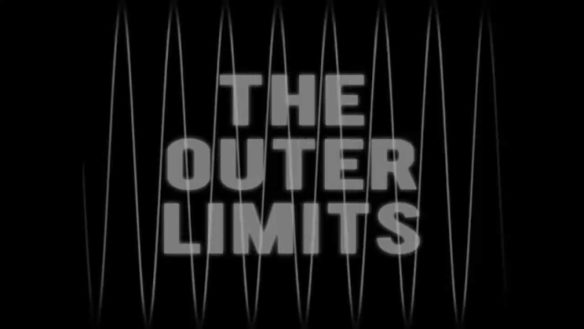
(10) TODAY’S BIRTHDAYS.
[Compiled by Cat Eldridge.]
- Born September 16, 1898 — Hans Augusto Rey. German-born American illustrator and author best remembered for the beloved Curious George children’s book series that he and his wife Margret Rey created from 1939 to 1966. An Eighties series of five-minute short cartoons starring him was produced by Alan Shalleck, along with Rey — Ken Sobol, scriptwriter of Fantastic Voyage, was the scriptwriter here. A later TV series (2006-2009) had many writers, including Craig Miller. Rey’s interest in astronomy led to him drawing star maps which are still use in such publications as Donald H. Menzel’s A Field Guide to the Stars and Planets. A simpler version for children called Find the Constellations, is still in print as well. (Died 1977.)
- Born September 16, 1930 — Anne Francis. You’ll remember her best as Altaira “Alta” Morbius on Forbidden Planet. She also appeared twice in The Twilight Zone (“The After Hours” and “Jess-Belle”). She also appeared in multiple episodes of Alfred Hitchcock Presents and The Alfred Hitchcock Hour. She’d even appear twice in The Man from U.N.C.L.E. and played several roles on Fantasy Island as well. (Died 2011.)
- Born September 16, 1932 — Karen Anderson. She co-wrote two series with her husband, Poul Anderson, King of Ys and The Last Viking, and created the delightful The Unicorn Trade collection with him. Fancyclopedia has her extensive fannish history thisaway, and Mike has her obituary here. (Died 2018.)
- Born September 16, 1927 — Peter Falk. His best remembered genre role is in The Princess Bride as the Grandfather who narrates the story. (The person who replaced the late Falk in the full cast reading of The Princess Bride for the Wisconsin Democratic fundraiser, Director Rob Reiner, wasn’t nearly as good as he was in that role.) He also plays Ramos Clemente in “The Mirror,” an episode of The Twilight Zone. And he’s Reverend Theo Kerr in the 2001 version of The Lost World. (Died 2011.)
- Born September 16, 1952 — Lisa Tuttle, 69. Tuttle won the Astounding Award for Best New Writer, received a Nebula Award for Best Short Story for “The Bone Flute,” which she refused, and a BSFA Award for Short Fiction for “In Translation”. My favorite works by her include Catwitch, The Silver Bough and her Ghosts and Other Lovers collection. Her latest novel is The Curious Affair of the Witch at Wayside Cross.
- Born September 16, 1960 — Mike Mignola, 61. The Hellboy stories, of course, are definitely worth reading, particularly the early on ones. His Batman: Gotham by Gaslight is an amazing What If story which isn’t at all the same as the animated film of that name which is superb on its own footing, and the B.P.R.D. stories are quite excellent too. I’m very fond of the first Hellboy film, not so much of the second, and detest the reboot now that I’ve seen it, while the animated films are excellent.
- Born September 16, 1960 — Kurt Busiek, 61. Writer whose work includes The Marvels limited series, his own outstanding Astro City series, and a very long run on The Avengers. He also worked at Dark Horse where he did Conan #1–28 and Young Indiana Jones Chronicles #1–8.
- Born September 16, 1970 — Nick Sagan, 51. Son of Carl Sagan. He’s written scripts for Next Generation and Voyager. Not to mention Space Precinct. He is the author of the three novels, Edenborn, Everfree and Idlewild.

(11) OCTOTHORPE. Octothorpe episode 40 is “Very Exuberant and Very Dangerous”. John Coxon is listening to podcasts, Alison Scott is reading stories, and Liz Batty is watching TV.
We are pleased to see that Corflu now has something about COVID on their webpage and we discuss the NHS COVID Pass. We also do Picks, in which we (wait for it) talk about science fiction we quite like for a bit.
Also, Octothorpe sent along this nifty art of Woomera by Alison Scott.
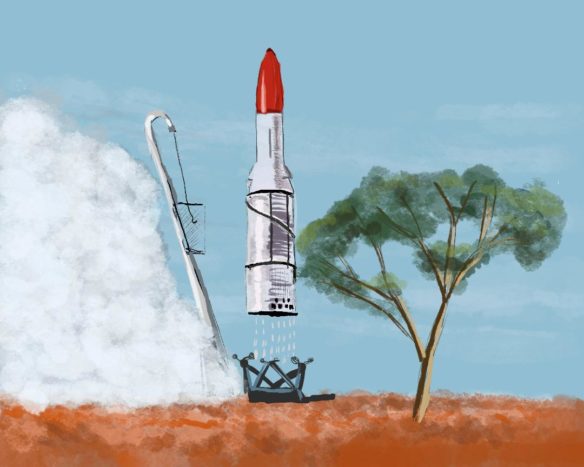
(12) WIDESPREAD HARASSMENT OF VIDEO GAME PLAYERS. Deseret News covers the statistics of a new report: “Gamers face online harassment when playing video games, ADL says”.
A new report from the Anti-Defamation League has found that most U.S. teens experience harassment when playing video games online.
The study said 60% of children 13 to 17 years old experience harassment when playing games online.
- And it doesn’t seem to be catching on with parents. Less than 40% of parents or guardians said they implemented safety controls for online games.
- And less than 50% of teen gamers said they talk to their parents about their online games.
Overall, gamers experience massive harassment online. The survey found 71% of adults from 18 to 45 years old “experienced severe abuse, including physical threats, stalking and sustained harassment within the first six months of 2021.”…
(13) HE LOVES ME, HE LOVES ME NOT. At CrimeReads, Olivia Rutligliano pays tribute to Pushing Daisies and why it was such a memorable, if weird, show. “Looking Back on the Magical Mystery Series Pushing Daisies”.
… Pushing Daisies might be most memorable for its bright, uncanny visuals—a merry, surreal palette of greens, reds, and yellows that don’t veritably exist in nature. The candy-colors of Pushing Daisies reflect its deep thematic investment in artificiality—on a tonal level, the show concerns simulacra of life, rather than life itself. Its characters cannot truly live the lives they want, and this is rather literal. Ned (Lee Pace) is a gentle, bashful entrepreneur (the proprietor and chef of a pie bakery called “The Pie Hole”) guarding a disquieting secret—he has the ability to bring dead things back to life with only a touch. But if he lets these newly animated entities live for longer than a minute or so, another entity of equal mass must die in its place, to restore the balance of the universe. Touching them a second time will return them to death, permanently—which means that if he wants to reconnect with anyone after they have passed, he only has a solitary minute to do so….
(14) BE SEATED. In episode 61 of the Two Chairs Talking podcast, “The joining of three tides”, David Grigg and Perry Middlemiss discuss their fannish projects outside the podcast: in Perry’s case his sercon genzine The Alien Review; and in David’s case his new fortnightly email newsletter Through the Biblioscope.
They also discuss two of the nominees for Best Novel in this year’s Hugo Awards: The Relentless Moon by Mary Robinette Kowal, and Network Effect by Martha Wells.
(15) NOW AWAITING COLLECTION. In the latest Nature, “Success! Mars Rover Finally Collects Its First Rock Core”.
…When the rover first attempted the manoeuvre, on 6 August, the rock it was trying to sample crumbled into powder before making it into a sample tube. The second attempt, on 1 September at a different location several hundred metres away, went smoothly: the drill bit pulled a slim cylinder out of a 70-centimetre long rock named Rochette. Engineers then paused the process so that they could photograph the core in its sample tube, to ensure it was intact, before sealing the specimen inside days later….
(16) VIDEO OF THE DAY. [Item by Martin Morse Wooster.] In “Honest Trailers: Snake Eyes–G.I. Joe–Origins” on YouTube, the Screen Junkies say, “Don’t care about the G.I. Joe movies?” No one else does,” and adds that the film comes from Paramount, “the studio who came in last at the box office for seven years straight.” The film features some great martial artists, but is under the direction of R.I.P.D. director Robert Schwentke, who loves his shaky cam, even though shaking a camera to make a film exciting “is like shaking a book to make it exciting.”
[Thanks to Cat Eldridge, Mike Kennedy, Andrew Porter, James Davis Nicoll, Soon Lee, David K.M. Klaus, SF Concatenation’s Jonathan Cowie, Martin Morse Wooster, JJ, Michael Toman, and John King Tarpinian for some of these stories. Title credit belongs to contributing editor of the day Soon Lee.]

